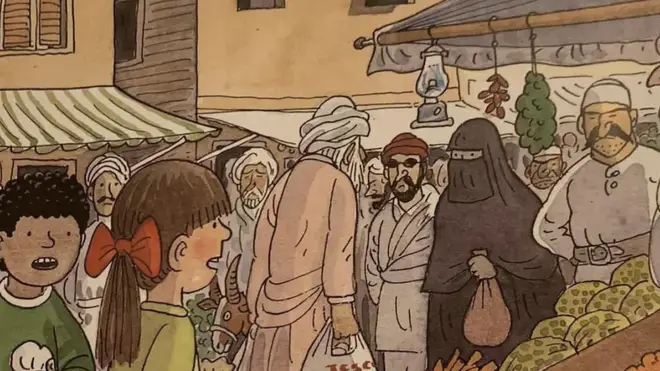
James O'Brien 10am - 1pm
27 April 2022, 09:20 | Updated: 27 April 2022, 10:52

A children's book has been withdrawn and its publisher apologised after complaints that its treatment of Muslims was racist.
Children in The Blue Eye story in the popular Biff, Chip and Kipper series find themselves in a foreign country and at one point they come across busy Middle East-looking outdoor market.
Characters are seen dressing stereotypically for the region. In one illustration a woman is seen in a niqab and men are wearing turbans.
One of the children, Biff, says: "The people don't seem very friendly."
Another, Wilf, says: "I don’t like this place. It's scary."
Now, the Oxford University Press [OUP], which publishes the book, said it has received complaints and carried out an independent review of it - and has destroyed the copies it already owns.
Read more: End of Sharia courts in jail: Crackdown on terrorists radicalising prisoners behind bars
The OUP said: "The book was taken out of print completely in March this year following an independent review, and is no longer available to purchase.
"OUP destroyed its own remaining stock of the book, although a small number of copies may still remain in the supply chain.
"Some older titles may still be available in libraries, or as second-hand copies.
Read more: Russia threatens to strike against Britain over its support for Ukraine
"At OUP, we regularly review and make changes to our list of titles to ensure they are up-to-date, diverse, inclusive and reflective of the world we live in, and we take steps to remove any products that are no longer appropriate.
"We also continuously listen to feedback from customers, and we take our responsibility to learn and improve very seriously.
"We sincerely apologise for the offence this book has caused."
The series, which numbers some 800 books, has been read by primary school children for three decades.
It was also turned into a show for young children on the BBC’s CBeebies channel.
The Telegraph said some readers believed the dialogue in question should be viewed in the context of the story’s villains pursuing characters and that children would be scare of being in places they don’t know.
One Twitter user complained the book would teach children how to be Islamophobic as well as how to read.
Ash Ahmad, a diversity and inclusion consultant, said on LinkedIn that many would have read the book when they were younger, but at the time did not see a problem.
"So inappropriate. People were brainwashed from a young age to stay away from Muslims labelled as scary people."
This article is being updated